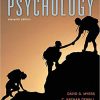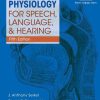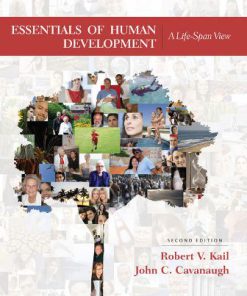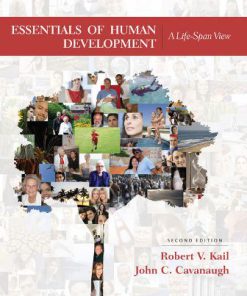Test Bank for Essentials of Human Development A Life Span View 2nd Edition by Kail
$35.00 Original price was: $35.00.$26.50Current price is: $26.50.
Test Bank for Essentials of Human Development A Life Span View 2nd Edition by Kail
This is completed downloadable of Test Bank for Essentials of Human Development A Life Span View 2nd Edition by Kail
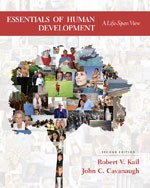
Product Details:
ISBN: 978-1305504585
Author: Robert V. Kail (Author), John C. Cavanaugh (Author)
ESSENTIALS OF HUMAN DEVELOPMENT: A LIFE-SPAN VIEW, 2nd Edition fills the need for a shorter text that emphasizes the essential, defining features of modern research and theory in human development. Using a modified chronological approach and emphasizing the biopsychosocial framework, the text provides: a readable account of human development across the life span; conceptual foundations that enable students to become critical interpreters of developmental information; and an introduction to relevant research and its application to key issues. The text also emphasizes the application of human development research across diverse professional settings, making it ideal for students who are pursuing a career related to psychology or areas such as education, health, and human sciences. Succinct and filled with real-life examples, this text will capture your students’ interest while introducing them to the essential issues, forces, and outcomes that make us who we are.
Important Notice: Media content referenced within the product description or the product text may not be available in the ebook version.
Table of Content:
- Ch 1: The Study of Human Development
- 1.1 Thinking about Development
- 1.2 Developmental Theories
- 1.3 Doing Developmental Research
- Summary
- Key Terms
- Part 1: Prenatal Development, Infancy, and Early Childhood
- Ch 2: Biological Foundations: Heredity, Prenatal Development, and Birth
- 2.1 In the Beginning: 23 Pairs of Chromosomes
- 2.2 From Conception to Birth
- 2.3 Influences on Prenatal Development
- 2.4 Labor and Delivery
- Summary
- Key Terms
- Ch 3: Tools for Exploring the World: Physical, Perceptual, and Motor Development
- 3.1 The Newborn
- 3.2 Physical Development
- 3.3 Moving and Grasping: Early Motor Skills
- 3.4 Coming to Know the World: Perception
- 3.5 Becoming Self-Aware
- Summary
- Key Terms
- Ch 4: The Emergence of Thought and Language: Cognitive Development in Infancy and Early Childhood
- 4.1 The Onset of Thinking: Piaget’s Account
- 4.2 Information Processing during Infancy and Early Childhood
- 4.3 Mind and Culture: Vygotsky’s Theory
- 4.4 Language
- Summary
- Key Terms
- Ch 5: Entering the Social World: Socioemotional Development in Infancy and Early Childhood
- 5.1 Beginnings: Trust and Attachment
- 5.2 Emerging Emotions
- 5.3 Interacting with Others
- 5.4 Gender Roles and Gender Identity
- Summary
- Key Terms
- Part 2: School-Age Children and Adolescents
- Ch 6: Off to School: Cognitive and Physical Development in Middle Childhood
- 6.1 Cognitive Development
- 6.2 Aptitudes for School
- 6.3 Special Children, Special Needs
- 6.4 Academic Skills
- 6.5 Physical Development
- Summary
- Key Terms
- Ch 7: Expanding Social Horizons: Socioemotional Development in Middle Childhood
- 7.1 Family Relationships
- 7.2 Peers
- 7.3 Electronic Media
- 7.4 Understanding Others
- Summary
- Key Terms
- Ch 8: Rites of Passage: Physical and Cognitive Development during Adolescence
- 8.1 Pubertal Changes
- 8.2 Health
- 8.3 Information Processing during Adolescence
- 8.4 Reasoning about Moral Issues
- Summary
- Key Terms
- Ch 9: Moving into the Adult Social World: Socioemotional Development in Adolescence
- 9.1 Identity and Self-Esteem
- 9.2 Romantic Relationships and Sexuality
- 9.3 The World of Work
- 9.4 The Dark Side
- Summary
- Key Terms
- Part 3: Young and Middle Adulthood
- Ch 10: Becoming an Adult: Physical, Cognitive, and Personality Development in Young Adulthood
- 10.1 Emerging Adulthood
- 10.2 Physical Development and Health
- 10.3 Cognitive Development
- 10.4 Who Do You Want to Be? Personality in Young Adulthood
- Summary
- Key Terms
- Ch 11: Being with Others: Forming Relationships in Young and Middle Adulthood
- 11.1 Relationships
- 11.2 Lifestyles
- 11.3 The Family Life Cycle
- 11.4 Divorce and Remarriage
- Summary
- Key Terms
- Ch 12: Work: Occupational and Lifestyle Issues in Young and Middle Adulthood
- 12.1 Occupational Selection and Development
- 12.2 Gender, Ethnicity, and Discrimination Issues
- 12.3 Occupational Transitions
- 12.4 Work and Family
- Summary
- Key Terms
- Ch 13: Making It in Midlife: The Biopsychosocial Challenges of Middle Adulthood
- 13.1 Physical Changes and Health
- 13.2 Cognitive Development
- 13.3 Personality
- 13.4 Family Dynamics and Middle Age
- Summary
- Key Terms
- Part 4: Late Adulthood
- Ch 14: The Personal Context of Later Life: Physical, Cognitive, and Mental Health Issues
- 14.1 What are Older Adults Like?
- 14.2 Physical Changes and Health
- 14.3 Cognitive Processes
- 14.4 Mental Health and Intervention
- Summary
- Key Terms
- Ch 15: Social Aspects of Later Life: Psychosocial, Retirement, Relationship, and Societal Issues
- 15.1 Theories of Psychosocial Aging
- 15.2 Personality, Social Cognition, and Spirituality
- 15.3 I Used to Work at …: Living in Retirement
- 15.4 Friends and Family in Late Life
- 15.5 Social Issues and Aging
- Summary
- Key Terms
- Ch 16: The Final Passage: Dying and Bereavement
- 16.1 Definitions and Ethical Issues
- 16.2 Thinking about Death: Personal Aspects
- 16.3 End-of-Life Issues
- 16.4 Surviving the Loss: The Grieving Process
- 16.5 Dying and Bereavement Experiences across the Life Span
- Summary
- Key Terms
- References
- Name Index
- Subject Index
People Also Search:
essentials of human development a life span view
essentials of human development a life span view 2nd edition
essentials of human development a life span view 2nd edition download scribd
essentials of human development a life span view 2nd edition test bank download pdf
essentials of human development a life-span view 2nd edition pdf
You may also like…
Solution Manual


